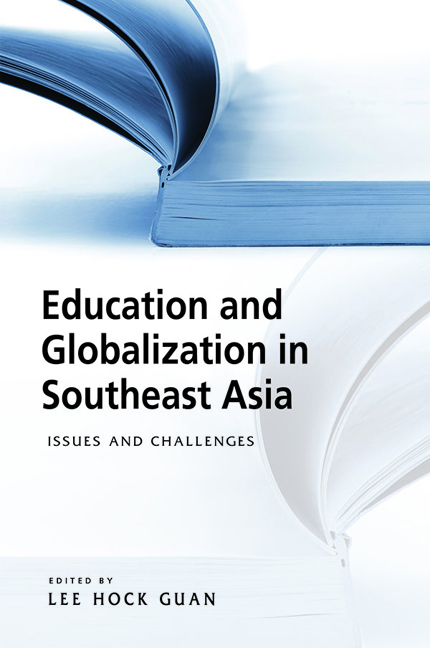Book contents
- Frontmatter
- Contents
- Acknowledgements
- Contributors
- Introduction
- 1 English in Singapore and Malaysia: Common Roots, Different Fruits
- 2 Globalization, Educational Language Policy and Nation-Building in Malaysia
- 3 Second-Order Change Without First-Order Change: A Case of Thai Internationalization of Higher Education
- 4 Higher Education in Malaysia: Access, Equity and Quality
- 5 Indonesian Higher Education: Gaps in Access and School Choice
- 6 Increasing Access to and Retention in Primary Education in Malaysia
- 7 Primary and Secondary Education in Myanmar: Challenges Facing Current Reforms
- Index
2 - Globalization, Educational Language Policy and Nation-Building in Malaysia
Published online by Cambridge University Press: 12 January 2018
- Frontmatter
- Contents
- Acknowledgements
- Contributors
- Introduction
- 1 English in Singapore and Malaysia: Common Roots, Different Fruits
- 2 Globalization, Educational Language Policy and Nation-Building in Malaysia
- 3 Second-Order Change Without First-Order Change: A Case of Thai Internationalization of Higher Education
- 4 Higher Education in Malaysia: Access, Equity and Quality
- 5 Indonesian Higher Education: Gaps in Access and School Choice
- 6 Increasing Access to and Retention in Primary Education in Malaysia
- 7 Primary and Secondary Education in Myanmar: Challenges Facing Current Reforms
- Index
Summary
INTRODUCTION
Globalization is a complex and multifaceted phenomenon. It is best understood as a modern process as well as one with historical antecedents and continuities with past eras (Tazreiter and Tham 2013). From the contemporary perspective, it involves the intensified flows of capital, goods, people, images and discourses around the globe, driven by technological innovations mainly in the field of media and information and communications technology (ICT) and resulting in new patterns of global activity, community and culture (Blommaert 2010).
Globalization has had a profound impact on the development of education worldwide. One of its impacts is in the area of educational language policy, which has a lot to do with the global spread of English brought about by globalization. Within the contemporary context of globalization, the global spread of English has been accentuated by agents of globalization, especially the neo-liberal ideology embraced by transnational corporations (TNCs) that use English as the in-house working language and the advent of ICT that relies on English as its operational language (Tan and Santhiram 2014). Both agents of globalization have increased the instrumental value of English in periphery-English countries, leading to the spread of English to these countries. For instance, in Russia alone, 50 million people are learning English. Meanwhile, English is the main foreign language in China (Watson 2000), and proficiency in this language is a key university entry requirement (Stanley and Lee 2011). What is worthy of note here is that the number of speakers of English as a second language (350 million according to one estimate) has exceeded the number of native English speakers (Nettle and Romaine 2000). Among other things, this spread of English is facilitated by increased emphasis given to English via educational policy intervention. In fact, a United Nations Educational, Scientific and Cultural Organization report (2002) notes that as the result of challenges arising from globalization, educational systems around the world are paying “special attention to foreign languages, first and foremost it is English” (cf. Rizvi and Lingard 2010, p. 176). Consequently, educational institutions become the sites where “the hegemony of the English language is spread, reproduced, but also contested” (Coulby 2005, p. 279).
- Type
- Chapter
- Information
- Education and Globalization in Southeast AsiaIssues and Challenges, pp. 36 - 58Publisher: ISEAS–Yusof Ishak InstitutePrint publication year: 2017



